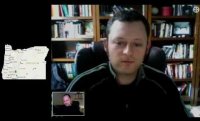We asked Ryan Fischer-Harbage of The Fischer-Harbage Agency, Inc., whose client list includes Ethan Brown, Courtney Eldridge, Bill Eppridge, Aliya King, Amy Sullivan, and Jackson Taylor, to fill us in on his book proposal writing class at Mediabistro.com.
Do most of your Mediabistro students have a book they’ve started when they sign up for your class?
Most people have an idea, and in addition to the workshop, I also teach an advanced class where people can only sign up if they have a rough idea of a book, or several ideas. I think these classes are most effective for people who are already into something.
Have most of your students received their MFA?
The thing I like about Mediabistro is that they attract working writers so it’s a wide mix of people. Right now I have a class of ten. Three of them have their MFAs and some of them are professionals in other things—there’s even a trainer, and then the others are journalists.
What does a book proposal look like?
So here’s the deal. When you’re selling a nonfiction book you don’t have to write the whole book. You only have to write a proposal. A TV writer writes a spec script, a musician puts together a demo tape, and whether you’re writing a memoir or a health and wellness title or narrative nonfiction, you write a book proposal. Generally speaking, a proposal is forty-five to seventy-five pages.
What is the standard template for a book proposal?
There are five or six components, perhaps the most important of which is the sample material from the book. In eight weeks, if my students do their homework, which probably 75 percent of the time they do, people have a working first draft of their proposal by the end of the course.
What is the success rate for your students getting their book sold?
It’s my experience that in every workshop, whether it’s a regular nonfiction book proposal workshop or an advanced workshop, at least one student from every group sells their book within ninety days of the class. And there are more that come later, but I usually hear about the ones right after the class.
I’m guessing that because you’re an agent you know what other agents are looking for?
I don’t necessarily tell people where to pitch their proposals. I’m more concerned with the actual craft than with the business side of things.
What are your top five tips when pitching a book proposal?
One: The big publishers won’t consider a proposal unless it’s from an agent. Obviously some of the small presses and university presses don’t care, but I always advise people to start at the top. You know, if you have the choice of Random House paying you real money for your book and getting copies in every store in the country, or a university press paying you nothing and getting your book on Amazon and a couple local bookstores, I think, Why not start at the top? Writers should be paid.
Two: Writers need to know to whom they’re pitching, which means having a real familiarity with what an agent does. Writers send agents a query letter, which is a one-page summary of their book, and it also includes a brief bio of the writer. I think this letter should be sent to agents that the writer’s research suggests would be interested in their book. For example, when I get a query letter that says, “Dear Agent,” and I see that fifty or seventy-five of my colleagues are cc’d on the e-mail, I just delete it. I don’t even read it. The writer put no time into sending it to me, and I feel no obligation into putting time into reading it. When someone sends me a letter that shows the writer is familiar with my work, I can’t just delete it because I feel and see that they’ve put a little bit of time into sending it to me, and I owe them time to read it.
Three: People often send their query letters out before their proposal is finished, and if I write back and say, “Great, I’d love to read it,” and I get a response like, “Oh, well, it’s going to be ready in six months, and I’ll send it to you,” I feel annoyed. I could get hit by a bus in the next six months. I think it’s much more professional to have the proposal finished and when someone says they’d like to read it—boom, you send it.
Four: The mistake I see most frequently is people don’t put enough time into their work. They rush things and they don’t engage in a meaningful editorial process of careful revision. Agents are a little more forgiving than editors. Agents will look at something more than once. We’re used to seeing things that are less developed, and a good agent will help develop a writer a bit, but the work has got to be done. We don’t talk about competition in this business, but it’s extremely competitive.
Five: Work finds its place. The market forces work pretty well—not perfectly, and certainly a lot of great work goes undiscovered, but when someone really focuses on his or her craft and does the footwork, whatever’s supposed to happen generally does.
Fischer-Harbage accepts queries via e-mail: ryan@fischerharbage.com. Based on a high volume of submissions, his only request is patience.






![LLOYD COLE - Writers Retreat! [OFFICIAL]](https://www.pw.org/files/styles/video_thumb_medium/public/media-oembed/i.ytimg.com/vi/yyWPpToywbg/hqdefault.jpg?itok=gKEEPplB)

